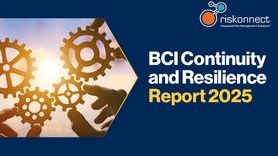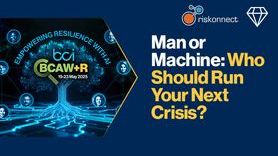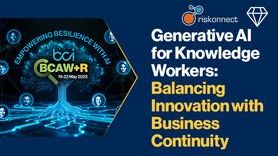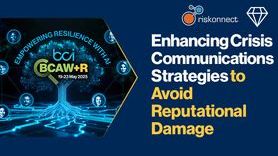The Great British BIA Off

Why your business continuity shouldn’t collapse like a soggy bottom.
Welcome to the tent - where instead of ganache and genoise, we’ve got spreadsheets, stakeholder angst, and the occasional panic about tolerances. This isn’t just a game of flour and flair. It’s BIA: the Business Impact Analysis, aka that one thing everyone says they’ve done but quietly forgets until the metaphorical oven catches fire.
Let’s unpack how this glittery chaos helps you bake resilience that actually holds shape.
Signature Bake: Important Business Services (IBS)
Every contestant walks in with confidence… until they realise their IBS list is less “critical services” and more “The COO likes this one.”
Resilience is earned when you:
- Identify impact categories that reflect customer pain - not just internal ego bruises.
- Set tolerances with backbone - not vibes (“recover ASAP” doesn’t cut it).
- Confirm process ownership without resorting to “Chris had it on his OneDrive since 2017.”
If the sponge collapses under light scrutiny, your resilience will too.
Technical Challenge: Tolerance Testing
Now the heat’s on. The oven’s short-circuited, half your team’s stuck at a conference called Resilience in the Age of AI, and Cassie in Accounts is the only one who knows how to run payroll.
This round separates the bakers from the bluffers:
- Is recovery coordinated, or chaotic?
- Are dependencies mapped, or guessed?
- Can the business escalate without tripping on its own supply chain?
This is where the BIA feeds scenario realism - not just theory but practice. Otherwise, you’ll be improvising with a spreadsheet and a prayer.
Blind Bake vs Technical Challenge: Agnostic vs Scenario Planning
Imagine blind baking with no recipe. That’s agnostic analysis. You test how well the business handles heat in general - no assumptions, just observations.
Then there’s the technical challenge: full-fat scenario planning.
- Supplier goes bust.
- The platform crashes at month-end.
- The dog deletes the recovery folder. (Unlikely, but trust me - anything happens.)
Best practice? You need both:
- Agnostic analysis highlights potential weak spots.
- Scenario planning shows how they actually rupture under pressure.
One is theory. The other is performance. Resilience comes from the combo - not the compromise.
Showstopper Round: Stakeholder Wrangling
Stakeholder logic can feel like making baklava without a guide. Layers upon layers - and someone always wants theirs with less sugar.
You’ll face:
- Marketing asking if the outage can “just be rescheduled.”
- IT wondering if this affects their quarterly Jira burndown.
- Legal still processing the incident from last November.
Your BIA makes the magic when:
- It communicates complexity without jargon.
- It maps impact in ways people feel.
- It creates cross-functional buy-in - no applause for solo resilience here.
Stakeholders may not love risk registers. But they do love clarity, relevance, and not being surprised mid-crisis.
Post-Incident Reports: Tent-Side Debrief
After the bake fails (or miraculously holds), it’s time for honest feedback.
A good post-incident report should be:
- Objective (“the sponge fell” - not “Tim always messes up”).
- Reflective (what indicators were missed? Was the BIA accurate?).
- Action-focused (what tweaks are needed before the next round?).
The worst sin? Filing it away like leftover custard. These reviews are your remix ingredients - so next time isn’t just reactive, it’s refined.
Final Thoughts: Bake Now, Panic Less Later
Resilience isn’t luck. It’s preparation, iteration, and knowing exactly when the oven’s about to explode. The BIA is your signature bake - it holds the layers of logic, tolerance, and stakeholder truth.
So, stop treating it like a passive form. Treat it like a showstopper.
You don’t want resilience that fluffs the centre. You want resilience that earns the handshake.
On your marks, get set… resilient.
About the author










































